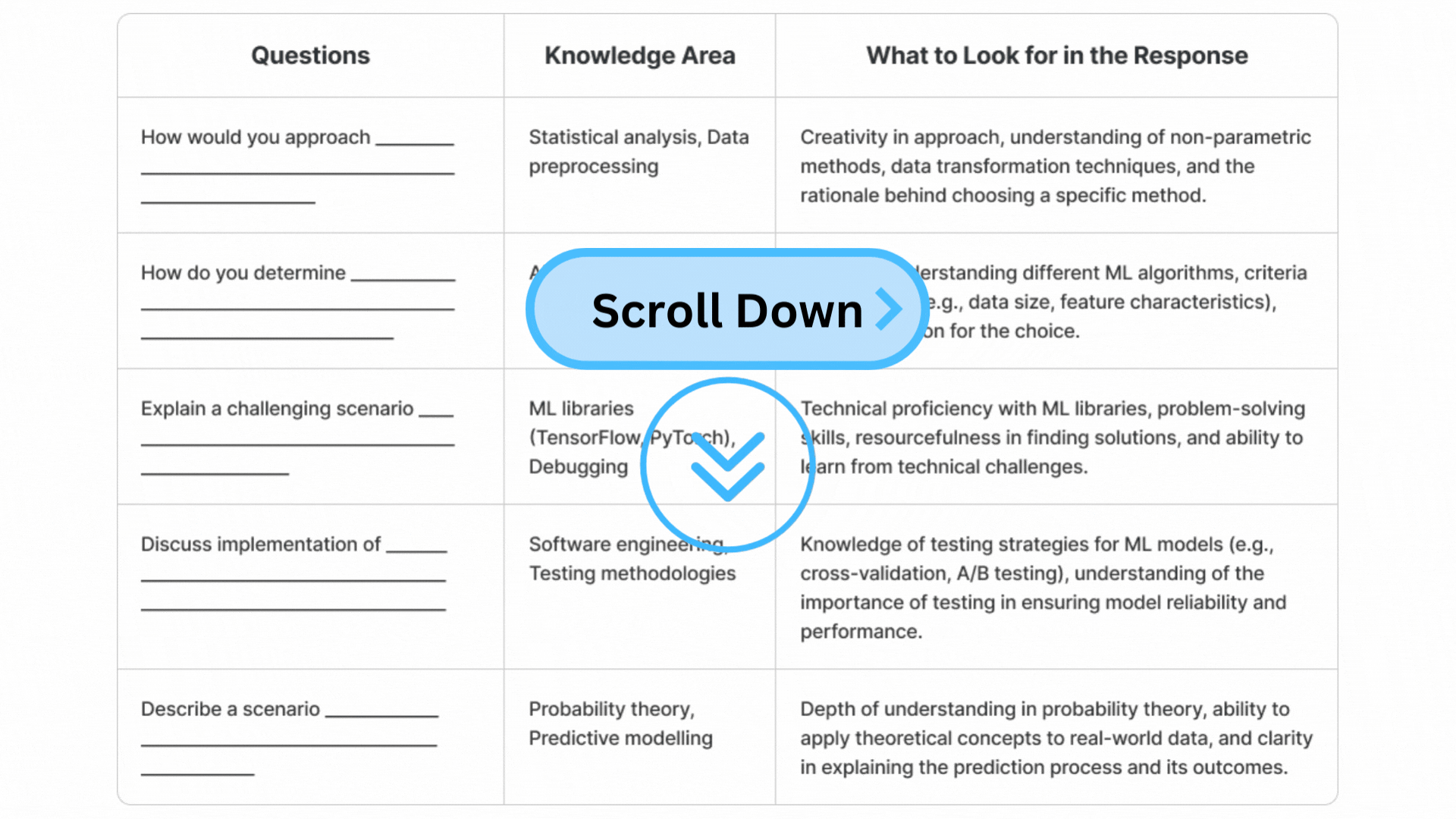Scroll Down for the complete table:

When evaluating candidates for Machine Learning (ML) Engineer roles, our recruiters at Tessera prioritize a balanced approach that recognizes the importance of both mathematical foundations and programming skills. Here's how we dissect these crucial components:
Mathematical Foundations
Problem-Solving Acumen: We assess a candidate's ability to approach complex problems with a mathematical mindset. This includes understanding patterns, statistical thinking, and applying theoretical models to real-world scenarios. It's not just about knowing the formulas but also about how and when to use them.
Algorithmic Understanding: A strong grasp of algorithms, especially those related to machine learning and deep learning, is crucial. We evaluate candidates on their familiarity with algorithmic design and optimization, which is fundamental in developing efficient ML models.
Statistical Analysis and Probability: These are the bedrock of machine learning. Our evaluation process includes understanding a candidate's ability to employ statistical methods and probability theory to analyze data and make predictions.
Programming Skills
Coding Proficiency: Practical programming skills are essential. We look for candidates who are not only proficient in languages commonly used in machine learning (such as Python and R) but also understand how to write clean, efficient, and scalable code.
ML Libraries and Frameworks: Familiarity with key ML libraries (e.g., TensorFlow, PyTorch) is a significant factor. We assess how candidates leverage these tools to implement, train, and deploy models effectively.
Software Engineering Best Practices: Beyond algorithms and models, a successful ML engineer must understand software engineering principles. This includes code versioning, testing, containerization, and deployment strategies which are crucial for integrating ML models into larger systems.
Top 5 questions our recruiters ask ML engineer candidates

The Evaluation Process

1. Resume Screening
Objective: To shortlist candidates based on their experience, educational background, and exposure to relevant technologies and projects.
Key Areas to Check:
Formal education in Computer Science, Statistics, or related fields.
Experience with machine learning projects and technologies.
Proficiency in programming languages (e.g., Python, R) and familiarity with ML libraries (TensorFlow, PyTorch).
Evidence of continuous learning and skill development.
2. Candidate Questionnaire
Objective: To classify candidates according to their skill sets, knowledge areas, and to gauge their technical expertise in more depth.
Sample Questions:
Rate your proficiency with various ML libraries (TensorFlow, PyTorch, Scikit-learn, etc.).
Describe a machine learning project you are most proud of and your role in it.
List the programming languages you are most comfortable with and provide examples of projects where you've used them.
3. Recruiter Interview
Objective: To assess the candidate's soft skills, depth of knowledge, and cultural fit.
Areas to Explore:
Problem-solving skills: Discuss a technical problem the candidate solved and the approach they took.
Teamwork and collaboration: Ask for examples of how they worked within a team on a project.
Adaptability: Inquire about a time they had to learn a new technology or approach it quickly.
Communication skills: Evaluate their ability to explain complex concepts in simple terms.
4. Client Submission
Objective: To present the candidate's profile, along with detailed insights from the previous steps, to the client for consideration.
Submission Package:
A comprehensive summary of the candidate's resume highlighting relevant experience and projects.
Insights from the candidate questionnaire that showcase their technical competencies and areas of expertise.
Evaluation from the recruiter interview focusing on soft skills, cultural fit, and overall suitability for the role.
Recommendations and any additional notes or observations that could aid the client's decision-making process.
Talk to Us
Have questions or want to discuss your AI/ML talent acquisition challenges? Our team at Tessera is here to offer expert guidance and support. Whether it's finding the perfect candidate or refining your hiring process, we're committed to helping your startup succeed. Reach out to start a conversation that could transform your team and propel your projects forward.
.png)
Comments